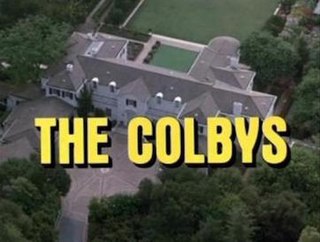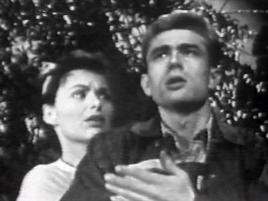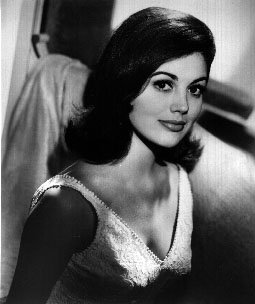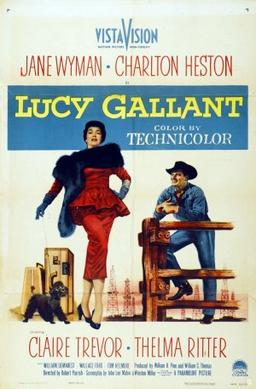Related Research Articles

Franklin James Schaffner was an American film, television, and stage director. He won the Academy Award for Best Director for Patton (1970), and is known for the films Planet of the Apes (1968), Nicholas and Alexandra (1971), Papillon (1973), and The Boys from Brazil (1978). He served as president of the Directors Guild of America between 1987 and 1989.

Charlton Heston was an American actor and political activist. He gained stardom for his leading man roles in numerous Hollywood films including biblical epics, science-fiction films and action films. He won the Academy Award as well as nominations for three Golden Globe Awards, and three Primetime Emmy Awards. He won numerous honorary accolades including the Jean Hersholt Humanitarian Award in 1978, the Golden Globe Cecil B. DeMille Award in 1967, the Screen Actors Guild Life Achievement Award in 1971, the Kennedy Center Honors in 1997, and the Presidential Medal of Freedom in 2003.

The Colbys is an American prime time television soap opera that originally aired on ABC from November 20, 1985, to March 26, 1987. Created by Richard and Esther Shapiro and Eileen and Robert Pollock and produced by Aaron Spelling, it is a spin-off of Dynasty and revolves around the Colbys, another vastly wealthy family who own a large multinational conglomerate and are connected to the Carringtons of Dynasty. Intended to surpass its predecessor in opulence, the series' producers were handed an immensely high budget for the era, and cast a handful of well-known movie stars among its leads.

Michael Charles Gauntlet Wilding was an English stage, television, and film actor. He is best known for a series of films he made with Anna Neagle; he also made two films with Alfred Hitchcock, Under Capricorn (1949) and Stage Fright (1950); and he guest starred on Hitchcock's TV show in 1963. He was married four times, including to Elizabeth Taylor, with whom he had two sons.

Robert Edward Stevenson was a British-American screenwriter and film director.

Robert Montgomery Presents is an American drama television series which was produced by NBC from January 30, 1950, until June 24, 1957. The live show had several sponsors during its eight-year run, and the title was altered to feature the sponsor, usually Lucky Strike cigarettes, for example, Robert Montgomery Presents Your Lucky Strike Theater, ....The Johnson's Wax Program, and so on.

Linda Melson Harrison is an American television and film actress. She played Nova in the science fiction film classic Planet of the Apes (1968) and the first sequel, Beneath the Planet of the Apes; she also had a cameo in Tim Burton's 2001 remake of the original. She was a regular cast member of the 1969–70 NBC television series Bracken's World. She was the second wife of film producer Richard D. Zanuck ; her youngest son is producer Dean Zanuck.

Jane Eyre is a 1943 American film adaptation of Charlotte Brontë's 1847 novel of the same name, released by 20th Century Fox. It was directed by Robert Stevenson and produced by the uncredited Kenneth Macgowan and Orson Welles; Welles also stars in the film as Edward Rochester, with Joan Fontaine playing the title character.
Robert Buckner was an American film screenwriter, producer and short story writer.
Blue Hills, created and written by Gwen Meredith, is an Australian radio serial about the lives of families, set in a fictional typical Australian country town called Tanimbla. The title "Blue Hills" itself derives from the residence of Dr. Gordon, the town's doctor.

Jane Eyre is the fictional heroine and the titular protagonist in Charlotte Brontë's 1847 novel of the same name. The story follows Jane's infancy and childhood as an orphan, her employment first as a teacher and then as a governess, and her romantic involvement with her employer, the mysterious and moody Edward Rochester. Jane is noted by critics for her dependability, strong mindedness, and individualism. The author deliberately created Jane as an unglamorous figure, in contrast to conventional heroines of fiction, and possibly part-autobiographical.

Edward Fairfax Rochester is a character in Charlotte Brontë's 1847 novel Jane Eyre. The brooding master of Thornfield Hall, Rochester is the employer and eventual husband of the novel's titular protagonist Jane Eyre. He is regarded as an archetypal Byronic hero.
Lee Robinson was an Australian producer, director and screenwriter who was Australia's most prolific filmmaker of the 1950s and part of the creative team that produced the late 1960s international hit television series Skippy the Bush Kangaroo.

Lucy Gallant is a 1955 American drama film directed by Robert Parrish and written by John Lee Mahin and Winston Miller. The film stars Jane Wyman, Charlton Heston, Claire Trevor, Thelma Ritter, William Demarest and Wallace Ford. The film was released on October 20, 1955, by Paramount Pictures.

Jane Eyre, the 1847 novel by English writer Charlotte Brontë, has frequently been adapted for film, radio, television, and theatre, and has also inspired a number of rewritings and reinterpretations.

The Pathway to the Sun is a 1949 novel by Australian author E. V. Timms. It was the second in his Great South Land Saga of historical novels.

Jane Eyre is a 1910 American silent short classic drama produced by the Thanhouser Film Corporation. Adapted from Charlotte Brontë's 1847 novel, Jane Eyre, the film mirrors the events and plot of the original book. The writer of the scenario is unknown, but Lloyd Lonergan probably adapted the work. The film's director is often and erroneously claimed to be Theodore Marston, but Barry O'Neil or Lloyd B. Carleton are possible candidates. The cast of the film was credited, an act rare and unusual in the era.
Michael John Lewis is a Welsh-born composer of film, theatre, television, and choral music. He studied harmony, counterpoint and composition at the Guildhall School of Music and Drama. After a brief teaching career in North London he became a full time composer at the age of 24.
"Of Human Bondage" is a 1949 American television play. Adapted from the novel Of Human Bondage by Somerset Maugham it was an episode of the anthology series Studio One. The adaptation was by Sumner Locke Elliott and the success of the show helped launch Elliott's television career.
The Willow Cabin is a 1949 novel by Pamela Frankau.
References
- ↑ "A business-minded young author". The Daily Telegraph. Vol. XV, no. 93. New South Wales, Australia. 8 July 1950. p. 23. Retrieved 26 September 2024– via National Library of Australia.
- ↑ "MUSIC AND THE THEATRE "Radio Is Doomed"As "Rusty Bugles" Author Sees It". The Sunday Herald (Sydney) . No. 50. New South Wales, Australia. 8 January 1950. p. 6 (Features). Retrieved 26 September 2024– via National Library of Australia.
- ↑ "Heston TV traied actor returning for sixth tie". The Evening Sun. 12 December 1949. p. 26.
- ↑ Kim, Erwin (1985). Franklin J. Schaffner. Scarecrow Press. p. 39. ISBN 978-0-8108-1799-9.
- ↑ "Tele Vues". Independent. 26 December 1949. p. 18.
- ↑ "Heston says movies tougher than video". The Los Angeles Times. 23 November 1950. p. 30.